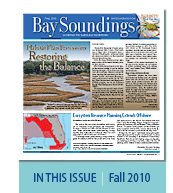 |
||||||||

Help Kids Learn to Love Outdoors
With a nip of fall in the air, residents across the Tampa Bay region are taking advantage of beautiful weather to enjoy local beaches, parks and wilderness preserves.
But while adults soak up fresh air after a long hot summer, kids may still be stuck inside with an electronic device. A new report from the Kaiser Family Foundation indicates that most kids spend more than seven hours a day indoors, watching television, playing video games or surfing the internet. Play time outdoors, meanwhile, is reduced to minutes per day.
The lack of exposure to nature is obviously a concern for managers who recognize that residents must be connected to the environment if we expect the next generation to continue to support the improvements we’ve seen over the past 30 years. Perhaps the epitome of the problem is the decision last year by the publisher of the Oxford Junior Dictionary to replace words like beaver and dandelion with blog and MP3 player.
Noted conservationist Robert Bateman responded: “If you can’t name things, how can you love them? And if you don’t love them, then you’re not going to care a hoot about protecting them or voting for issues that would protect them."
Beyond the broader implications for society, parents need to take a careful look at more-personal reasons to spend time outside with their children. Groups as disparate as the National Wildlife Federation, the US Fish and Wildlife Service and education.com are reporting new research that shows significant benefits for kids who spend regular unstructured time outdoors — not necessarily parks or nature preserves, just their own backyards.
The NWF report (available online at www.nwf.org/getoutside) details a wide range of benefits for children who spend time outdoors:
- Keeps them engaged in school work and less likely to drop out of school
- Measurably improves classroom performance in math, science, reading and social studies
- Increases scores on standardized tests in basic skills as well as college entrance exams
- Helps them learn across disciplines so they’re better real-world problem solvers.
The corollary to those benefits is that kids who don’t spend time outside are more likely to be obese, have diabetes or asthma, and show inappropriate aggression.
If you have children, consider spending time in your own backyard or a nearby park, preferably with a hiking trail and not a ball field. If you don’t have kids living with you, there are numerous opportunities to volunteer at local schools and organizations like Earth Force (www.earthforce.org) or the Sierra Club’s Inner City Outings (www.sierraclub.org) which introduces kids from inner city neighborhoods to the outdoors.
Whatever you do, take some time this month to share the great outdoors with a child!
